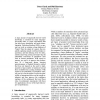Free Online Productivity Tools
i2Speak
i2Symbol
i2OCR
iTex2Img
iWeb2Print
iWeb2Shot
i2Type
iPdf2Split
iPdf2Merge
i2Bopomofo
i2Arabic
i2Style
i2Image
i2PDF
iLatex2Rtf
Sci2ools
130
click to vote
KCAP
2009
ACM
2009
ACM
Large-scale extraction and use of knowledge from text
A large amount of empirically derived world knowledge is essential for many languageprocessing tasks, to create expectations that can help assess plausibility and guide disambiguation. Following Schubert (2002), we present our work on creating a large database of "tuples" from the output of a parser, thus implicitly capturing simple world knowledge expectations, and then utilizing it for two tasks, namely improving parsing and improving the plausibility assessment of paraphrase rules used in textual entailment. With regard to parsing, our goal is to improve the performance of a large-scale phrase structure parser/grammar of English through a method that does not depend on the need to handannotate a large number of sentences beyond those available from existing treebanks. With regard to the plausibility of paraphrase rules, our goal is to use the tuples to assess the plausibility of instantiated rules used in textual entailment, and thus improve the confidence rankings of the...
Related Content
| Added | 28 May 2010 |
| Updated | 28 May 2010 |
| Type | Conference |
| Year | 2009 |
| Where | KCAP |
| Authors | Peter Clark, Philip Harrison |
Comments (0)

